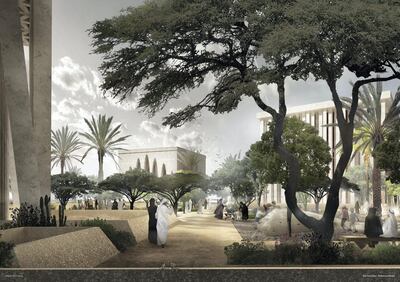Interfaith dialogue and cooperation is the essence of human existence whether it is on a local level with cooperation to assist needy neighbours or on an international scale, such as the initiative in Abu Dhabi to develop an Abrahamic family house.
Over the past year since the Covid-19 pandemic began, I have seen the beauty of this where I live in London as Muslims, Christians and people of other faiths or no faith in my local area have worked together to run food banks and baby banks for the less fortunate.
Communication between the religions can support such valuable humanitarian interfaith action, based on shared values of compassion.
The global project for human fraternity and world peace embodied by the Abrahamic Family House, to be built in Abu Dhabi over the next few years, is driven by the same impulse.
The centre is to comprise a synagogue, church and mosque on the one site, along with a cultural centre and open spaces for believers from the Abrahamic faiths to worship, meet, mingle and get to know each other.
The call in the Quran is for Jews, Christians and Muslims to come to “a common word” on monotheism, a common word that the three faiths actually agree on.
God’s creation of humanity as different nations and tribes was “that you may know each other” – and not to hate each other.
In February, we marked the UN's International Day for Human Fraternity. This was the second anniversary of the signing of the document on Human Fraternity for World Peace and Living Together, jointly signed in Abu Dhabi in 2019 by the Pope and the Grand Imam of Al-Azhar, with the support of the UAE government.
The document draws on Biblical and Quranic teachings and emphasises universal, shared values. It constitutes an invitation to reconciliation and fraternity among all believers, indeed among believers and non-believers, and among all people of good will.
Such interfaith coexistence and dialogue are not new: the medieval scholar Ibn Kathir described how Muslims and Christians shared the Umayyad Mosque of Damascus for worship for 70 years. Even today, Muslims and Jews share parts of the Al-Aqsa Mosque in Jerusalem and the Abrahamic Mosque in Hebron for worship. In my home town, the Palmers Green Mosque in north London shares its site with a Hindu temple and with soccer playing fields for local secondary schools.
A street and accompanying neighbourhood in Canada, dubbed the Highway to Heaven, has about 20 places of worship with intense interfaith dialogue and activity, including mosques, churches and temples (Hindu, Buddhist and Sikh).

Hans Kung, a leading contemporary Christian theologian, famously said that peace among the nations of the world requires peace among the religions, that in turn requires dialogue between the religions. After the horrific conflicts of the early part of this century, it was obvious that more dialogue was needed between Islam and the other major world religions. The good news is that this has, indeed, happened, and come along in leaps and bounds over the past two decades.
A Common Word, a Muslim-Christian dialogue project initiated by Muslim leaders in 2007 has brought together leading theologians of both faiths and inspired dialogue everywhere, from places of worship to top universities. Its official website lists nearly 1,000 press articles that have been carried by thousands of outlets. Given that in 2020, almost a third of the world’s population was Christian in some sense (2.4 billion or 31 per cent), while a quarter was Muslim (1.9 billion or 25 per cent), these two faiths together represent well over half of the world’s population (4.3 billion or 56 per cent). And by 2050, Christianity and Islam are projected to represent the religions of more than 60 per cent of the world’s population.
These facts underline the pressing need for Christian-Muslim dialogue worldwide, a need that will last for generations.
A Common Word, a peacebuilding dialogue that has the potential to include over half the world’s population is, therefore, a brilliant recent global contribution that was initiated in the Muslim world.
It also increases hope for the realisation of an “Islamo-Christian Civilisation”, as argued for by Professor Richard Bulliet ("The Case for Islamo-Christian Civilisation", Columbia University Press, 2006) that would be a major force for goodness, stability and peace globally.
With so much conflict and crisis in the world, important initiatives such as the Abrahamic Family House should be celebrated, and it is hoped that these sorts of projects will continue to inspire others devoted to bringing peace and harmony to our troubled world.
Usama Hasan is a Research Consultant at the Tony Blair Institute for Global Change. He has co-authored an Abrahamic dialogue book called 'People of the Book: How Jews, Christians and Muslims Understand their Sacred Scriptures' (Jessica Kingsley Publishers, 2019)






